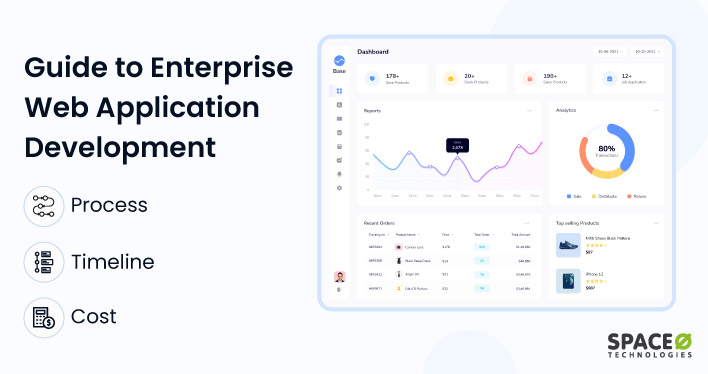- If you are developing an enterprise web app solution, web app architecture plays an important role. It ensures the scalability of the enterprise web apps, maintaining a smooth user experience.
- The cost associated with developing an enterprise web application approximately ranges from $40000 to $120000 for small enterprise apps to large enterprise apps.
Key Takeaways
Do you want to optimize your business process? Looking for enterprise web application development for your business?
You are at the right place.
Enterprise web application leads to improved communication and coordination within an organization resulting in improved decision-making. So, if you are looking to develop a successful enterprise web application, being a leading enterprise web application development company, we can help you.
Since we have more than a decade of experience in developing and delivering enterprise web solutions, we know the process, time, and cost of developing enterprise web app solutions.
Let’s start with a basic understanding of enterprise web applications.
Table of Contents
- What is an Enterprise Web Application?
- 5-Steps for Enterprise Web App Development
- 6 Features for Enterprise Web Application
- Enterprise Web Applications Tech Stack
- Cost to Develop an Enterprise Web App
- Time to Develop an Enterprise Web App
- Top Enterprise Web Application Examples
- 4 Benefits of Enterprise Web Apps
- Frequently Asked Questions
- Ready to Develop an Enterprise Web App?
What is an Enterprise Web Application?
An enterprise web application is a scalable software application that runs online through web browsers, specifically designed to fulfill the complex needs of large organizations. It includes a wide range of functionalities such as data management, process automation, collaboration, and reporting.
Enterprise web apps place a strong emphasis on security, integration, customization, and user experience, to optimize business operations and support decision-making. The main goal of enterprise web portal development is to enhance communication and engagement within the company and with customers through easy-to-use, scalable apps.
- CRM helps enterprise-level businesses to manage their interactions with current and potential customers.
- SCM manages the flow of goods and services in a business, from the initial stages of procurement to the final stages of delivery.
For instance:
Now, let’s understand the process to develop enterprise web applications.
Follow the Easy 5-Step Process for Enterprise Web Application Development
Below is a brief step-by-step process of developing an enterprise web application in 5 steps.
Plan and Gather Your Project Requirements
First, what you need to do is thoroughly define the objective of your project, the problems it will be solving, and the specific requirements needed to achieve business objectives.
- Clearly outline what your enterprise web app will do and its features.
- Define the current pain point in your organization and know how your solution addresses the pain points.
- Identify the clear value proposition for your enterprise web app.
- Figure out any specific technology or systems your enterprise web app should work with.
- Conduct market research to understand the competitive landscape.
- Identify possible risks that could impact your enterprise web app.
- Prepare the necessary documentation like technical guides and user manuals.
This should include:
This step helps you with a clear direction for your project. Planning ensures your goals align with successful enterprise web software development.
Contact an Enterprise Web Development Company
Once you understand and gather your project requirements, now you need to contact a reputable enterprise web development company. To develop an enterprise web app, reach out to top-rated companies that provide enterprise web application development services. Most companies have dedicated teams of skilled enterprise web developers developers, designers, and project managers who can understand your requirements and develop custom enterprise web solutions.
But, now the question arises, how would you choose an enterprise application development company?
Let’s understand below:
- Check the portfolio, case studies, and years of experience in relevant industries.
- Verify that the company is proficient in utilizing modern technologies.
- Examine client testimonials and seek references from established enterprises.
- Ensure the company’s team size can handle your project.
- Understand the cost of developing the enterprise web app and its pricing structure.
Factors to Consider While Choosing an Enterprise Web App Development Company
Space-O Technologies even has the expertise to develop enterprise web applications such as Sahanbooks, Urder, NFC Jewelry App and One8. We use Agile methodology and Scrum frameworks for developing enterprise solutions that meet your specific requirements. Along with that, we use the most updated technology stack to scale your enterprise web app solution.
We understand that this is a difficult task, and if you do not want to spend time looking for an appropriate company, we are here to help you.
Create the Design and Architecture of your Application
Once you have chosen an enterprise web development company, the BA team creates a wireframe and designs the UI/UX of your web app. In this step, you’ll work closely with your design team and business analyst team to create a great user experience and a website structure for your application. This process includes creating wireframes and prototypes that give a visual representation of your application’s layout.
Consider elements of the user interface (UI) like colors, fonts, and the overall look, and the user experience (UX) to ensure the app is easy and intuitive to use. The blend of UI and UX enhances the usability and appeal of your web app, creating an engaging user experience. You can even hire our UI/UX designer team, as we have experience designing UI across different industry verticals like entertainment, sports, healthcare, fitness, and education.
Develop the Front-end and Back-end of Your Web App
When the UI/UX of your enterprise web app is ready, the development team develops the front-end and back-end of your web app. Front-end development and back-end development serve as essential parts of the creation of your web project.
- Front-end development: For developing front-end, web app developers use HTML, CSS, and JavaScript web development frameworks like AngularJS, ReactJS, or Vue.js to speed up development and simplify complex tasks. It includes building visual and interactive elements such as buttons, forms, and animations that you see when using the app.
- Back-end development: Back-end development ensures that when you click a button or fill out a form, the app understands what to do with the data. It involves securely storing data, safeguarding your login information, and linking the app to databases where all of the information is saved.
Your app goes through multiple changes during the entire code development process until the expected output is not delivered. A project manager assigned to you defines the milestones to deliver the enterprise web app as per your expected timeline.
You need to perform extensive quality tests during this step to ensure that your web apps run properly and provide a pleasant user experience.
Test, Deploy and Maintain Your Web Application
In the final phase, you ensure that your application fulfills the highest functional, security, and performance standards. In order to find and fix problems, your team carries out multiple sorts of testing, including functional, usability, and performance testing.
The deployment phase begins when the testing phase is completed. Finally, in order to keep your web app working properly and safely, you must regularly monitor and manage it. Regular maintenance will increase the effectiveness and lifetime of your web app.
So far, we have learned the entire process for developing an enterprise web application, now let’s discuss its features that make them stand apart.
Want to Develop an Enterprise Web App for Your Business?
With our experience in delivering enterprise web app solutions, we help you to choose the tech stack and plan a strategy to move ahead.

6 Advanced Features to Integrate Into Enterprise Web Application
Here is a table containing the advanced features that need to be integrated into your enterprise websites to enhance its business functionality and provide a satisfying user experience.
| No. | Advanced Features | Description |
|---|---|---|
| 1 | Blockchain Integration | Ensure secure and transparent data transactions. |
| 2 | Advanced Analytics and Reporting | Allow for detailed data analysis and reporting in order to make data-driven decisions. |
| 3 | Real-time Collaboration | Ensure real-time communication and collaboration. |
| 4 | Augmented Reality (AR) and Virtual Reality (VR) | Provide immersive experiences for training, product visualization, and remote collaboration. |
| 5 | Artificial Intelligence and Machine Learning | Incorporate AI/ML capabilities for automation and personalization. |
| 6 | Voice and Natural Language Processing | Enable natural language interaction and voice commands. |
Let’s now understand the tech-stack required to develop enterprise web app solutions.
Technology Stack Used in Developing Enterprise Web Applications
Choosing the correct technology stack & platform for enterprise web development is crucial for the success of your business. Here is a technology stack for you to develop your enterprise web app solution.
| Components | Technology |
|---|---|
| Front-end | HTML5, CSS3, JavaScript (ES6+) |
| Angular, React, Vue.js | |
| Back-end | Java, Python, Ruby, Node.js, C# |
| Spring Boot, Django, Ruby on Rails, Express.js, ASP.NET | |
| Databases | MySQL, PostgreSQL, SQL Server |
| MongoDB, Cassandra, Redis | |
| APIs/Web Services | RESTful APIs, GraphQL |
| Server Environment | Apache, Nginx |
| Tomcat, Jetty | |
| Authentication | OAuth, JWT |
| HTTPS, SSL/TLS | |
| Containerization | Docker |
| Deployment | Kubernetes, Docker Swarm |
| Version Control | Git |
| GitHub, GitLab, Bitbucket | |
| Monitoring/Logging | Prometheus, Grafana |
| Log4j, Winston | |
| Cloud Services | AWS, Azure, Google Cloud |
| Serverless Computing | |
| Messaging/Queues | RabbitMQ, Apache Kafka, AWS SQS |
| Search/Indexing | Elasticsearch |
| Testing Frameworks | JUnit, Jest, Selenium |
| CI/CD | Jenkins, CircleCI, Travis CI |
| Task/Job Scheduling | Cron, Celery, Quartz |
| Front-end Libraries | jQuery, Bootstrap, Material-UI |
| Error Tracking | Sentry, Rollbar |
By choosing a reliable stack, your enterprise web app development team will be able to design scalable online applications. But, how much does it cost to develop an enterprise web app solution. Let’s understand in the next section.
How Much Does It Cost to Develop an Enterprise Web Application?
As you may already know, the cost to develop an enterprise web application depends on various factors such as the type of app, its complexity, what type of features and various functions are included in the app and the technology stack used.
But to help you out let’s have a look at the table containing the cost of a CRM web app.
| Category | Cost Estimation |
|---|---|
| Small scale enterprise app | $40000-$50000 |
| Medium scale enterprise app | $62000-$79000 |
| Large scale enterprise app | $68000-$120000 |
How Much Time Does It Take to Develop an Enterprise Web Application?
Just like the cost, the timeline of a web project depends on multiple factors, including complexity, features, and the overall project scope. To give you an idea, let’s take an example of a CRM web app and its features, and provide you with the approximate time in the table below:
| Category | Features and Functionalities | Timeframe |
|---|---|---|
| Small scale enterprise app |
| 7-9 months |
| Medium scale enterprise app |
| 11- 14 months |
| Large scale enterprise app |
| 12 – 20 months+ |
After exploring the time it takes to develop an enterprise website, let’s understand with some examples that help you understand more about an enterprise web application.
Top Enterprise Web Application Examples
Here is a table containing examples of web apps to help you get clarity about enterprise web development.
| Enterprise Web Applications | Category | Key Features |
|---|---|---|
| CRM (Customer Relationship Management) |
| |
| HRM (Human Resources Management) |
| |
| Enterprise resource planning (ERP) |
| |
| Communication |
| |
 | eCommerce |
|
| IT Service Management |
|
After exploring the table, you might be wondering about the benefits that have enabled such companies for web development. Let’s take a closer look at the advantages of enterprise websites.
4 Benefits of Enterprise Web Applications
Now, let’s learn about the top 4 benefits of enterprise web development.
Saves Cost and Increases Efficiency
Web apps can automate various repetitive tasks, which reduces costs in terms of labor hours, hardware and maintenance. Also, the cost of office space and overhead is minimized as web-based applications enable remote work opportunities. Adopting a cost-efficient approach through enterprise web development not only boosts productivity but also ensures effective cost control across the business.
Ensures Seamless Cross-Platform Compatibility
The enterprise web app leverages web technologies that enable your application to run smoothly on various devices such as desktop computers, laptops, tablets, and smart mobile devices. This helps in eliminating the requirement of platform-specific development, streamline updates, reach out to a wider audience, and reduce complexities. Users can switch between devices and continue their work without interruption.
Offers a High Level of Security
Whenever you consider any kind of app, security should be a top priority. Enterprise web applications stand out as they are built with security measures like data encryption, secure authentication, and regular security updates. Adhering to the stringent security requirements, rest assured that your web application is well-protected against cyberattacks and unauthorized access.
Provides Higher Scalability Options
Enterprise web applications provide the flexibility to scale up your resources and server capabilities to fulfill the evolving needs of multiple users. This makes sure that high loads are handled, performance is maintained, and the user experience is smooth. Whether dealing with an increase in client orders or managing increased data traffic, this scalability ensures that your business operations continue to run smoothly and without interruptions.
Hire Developers to Develop an Enterprise Web Application
Our team of dedicated web application developers develops scalable solution as per your needs. Let’s discuss your requirements.
Even after exploring all aspects such as the process, features, cost, and benefits of the enterprise website application, if you still want to have more clarity, here is a section of frequently asked questions that might help you out.
Frequently Asked Questions About Enterprise Web Application Development
What are the future trends in enterprise web applications?
Here are the future trends in enterprise website applications.
- Introduce Voice User Interfaces (VUIs) for seamless interactions.
- Establish a microservices architecture to create a flexible application structure.
- Integration of Artificial Intelligence and Machine Learning.
- Serverless computing for cost-effective scalability.
- Integration of the Internet of Things (IoT) for networked applications.
What are the best practices for enterprise web development?
Here are the best practices to focus on for enterprise web development.
- Plan your project well, involve key people, and make sure it matches your business goals.
- Must follow coding standards and guidelines for maintainable code.
- Optimize performance to achieve faster page load times.
- Completely test and troubleshoot to identify and fix issues.
- Utilize responsive design to provide a consistent user experience.
- Update and maintain the application periodically.
What is the difference between web applications and enterprise applications?
The difference between web applications and enterprise applications lies in their scope and purpose. Web applications are available via web browsers and cater to a large audience, focusing on certain tasks or functions. As opposed to this, enterprise apps are utilized internally within enterprises to handle complicated business requirements and procedures.
Ready to Develop an Enterprise Web Application for Your Business?
From this blog you have understood the process, benefits, cost, time, and timeline for developing enterprise website solutions.
So, if you are looking for a company that optimizes business processes, or help you in delivering custom web application solutions, your search ends here. We are here to help as we have served a variety of industries and maintained a worldwide client base of over 1200.
Let’s connect and discuss your requirements with us. Together, we can create a successful web application that is tailored to your business needs.



